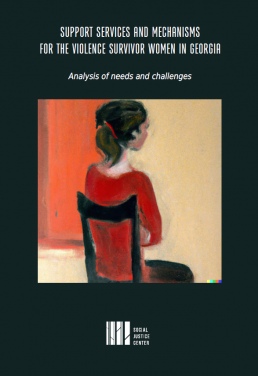საერთო ცხელი ხაზი +995 577 07 05 63


The initial response to and prevention of violence against women in Georgia began with the adoption of the national law on domestic violence in 2006, followed by the establishment of other critical response and protection mechanisms. Subsequent milestones include the opening of the first shelter and the launch of a telephone helpline for victims of violence in 2010. Domestic violence was criminalized in 2012, and in 2017, the Istanbul Convention was ratified. The year 2018 saw the establishment of the Human Rights Protection and Monitoring Department in the Ministry of Internal Affairs. Additionally, legislative changes regarding sexual harassment were implemented in 2019 (UN Women, 2021, p. 71).
According to the Istanbul Convention, the state is obliged to provide a wide range of services in response to the diverse needs of victims of violence, which, in addition to physical security, includes legal and psychological counseling, medical and social services, financial assistance, shelter, education, and job search assistance. In addition, the state is obliged to take all necessary measures to establish effective inter-agency cooperation to protect and support victims of violence. This implies the coordinated work of the judiciary, Prosecutor's Office, law enforcement agencies, non-governmental organizations, and other relevant organizations/bodies in the victim's interests (Council of Europe Convention on prevention and suppression of violence against women and domestic violence, Article 18). The Convention obliges the state to respond at the national, regional, and local levels through multi-sectoral and multi-agency interventions, which is especially important to receive services on a "one-stop shop" basis (GREVIO, 2022, p. 54). The National Action Plan on Combating Violence Against Women and Domestic Violence and Measures to be Implemented for The Protection of Victims (Survivors) for 2018–2020 stipulated the creation of a national referral mechanism. According to the baseline assessment report of the Group of Experts on Combating Violence Against Women and Domestic Violence (GREVIO), these procedures have been prepared but not approved, which prevents effective coordination and cooperation (ibid., p.41). Despite significant changes, there are many challenges in accessing services and protection mechanisms for victims of violence today, which we will address in this research report.
The research findings indicate that victims of violence often have less trust in public services due to the risk of re-traumatization. To maintain a system of protection and support for victims of violence and to create adequate services, it is necessary to introduce the principles of trauma-informed care. This approach involves maximally informing service providers about the effects of trauma and ways of its manifestation, which will help establish trust between the recipient and the service provider and build a healthy relationship. In addition, it is essential that victims of violence are actively involved in decision-making processes and that service providers respect their autonomy. Considering women's experiences with different cultural backgrounds and identities, cultural sensitivity is crucial. Trauma-informed care focuses on the victim's strengths and avoids pathologizing the victim's condition, which also reduces the risk of retraumatization (Elliot, Bjelajac, Fallot, Markoff, & Reed, 2005). Introducing these principles will increase the effectiveness of the support system in terms of service delivery. According to the research, non-governmental organizations are guided by these approaches, which is why they deserve more trust from violence survivors.
State services and legal mechanisms for protection and support for women victims of violence operate in Georgia, such as shelters, crisis centers, 112 - single emergency service number, 112 mobile application, 116 06 counseling telephone hotline, restraining and protective orders, electronic monitoring mechanism of abuser, Human Rights Protection Department of the Ministry of Internal Affairs (MIA), service of the witness and victim coordinator from the MIA and the Prosecutor's Office. In addition, non-governmental organizations play a crucial role as service providers, offering victims of violence shelters, social workers, psychologists, lawyers, medical professionals, and other necessary services. This study delves into each service and mechanism, discussing the steps taken and addressing the existing challenges.
The website accessibility instruction